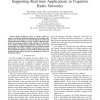Free Online Productivity Tools
i2Speak
i2Symbol
i2OCR
iTex2Img
iWeb2Print
iWeb2Shot
i2Type
iPdf2Split
iPdf2Merge
i2Bopomofo
i2Arabic
i2Style
i2Image
i2PDF
iLatex2Rtf
Sci2ools
139
click to vote
GLOBECOM
2010
IEEE
2010
IEEE
Admission Control and Channel Allocation for Supporting Real-Time Applications in Cognitive Radio Networks
Abstract--Proper admission control in cognitive radio networks is critical in providing QoS guarantees to secondary unlicensed users. In this paper, we study the admission control and channel allocation problem in overlay cognitive radio networks under the maximum cumulative delay constraint. We formulate it as a Markov decision process problem, and then solve it by transforming the original formulation into a stochastic shortest path problem. We further simulate the performance of a class of threshold-based admission control with the largest-delay-first channel allocation policy, and show its advantage over other two benchmark policies.
Admission Control | Channel Allocation | Cognitive Radio Networks | Communications | GLOBECOM 2010 |
Related Content
| Added | 11 Feb 2011 |
| Updated | 11 Feb 2011 |
| Type | Journal |
| Year | 2010 |
| Where | GLOBECOM |
| Authors | Feng Wang, Junhua Zhu, Jianwei Huang, Yuping Zhao |
Comments (0)

